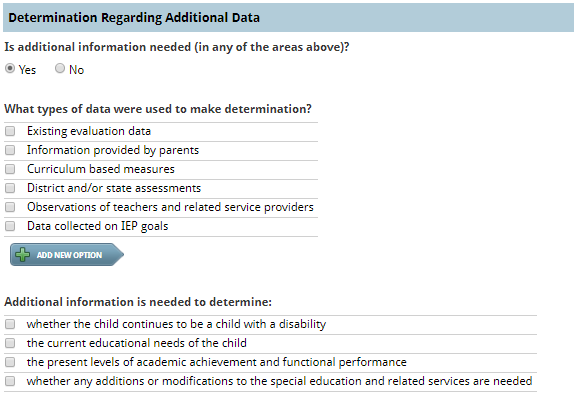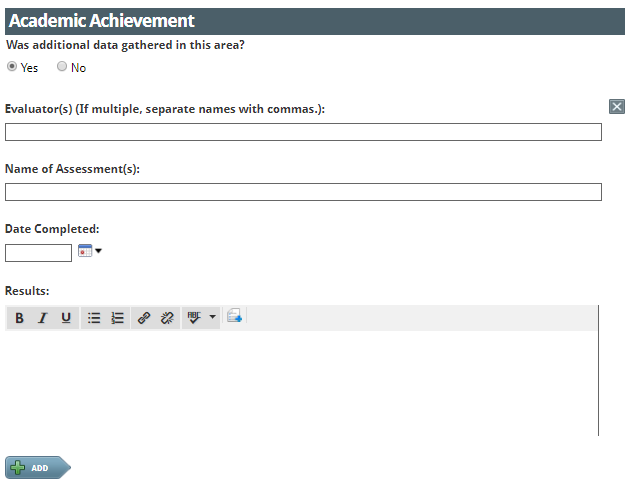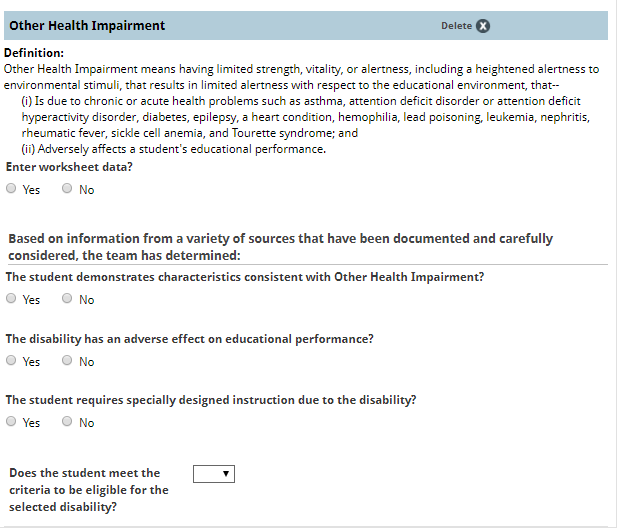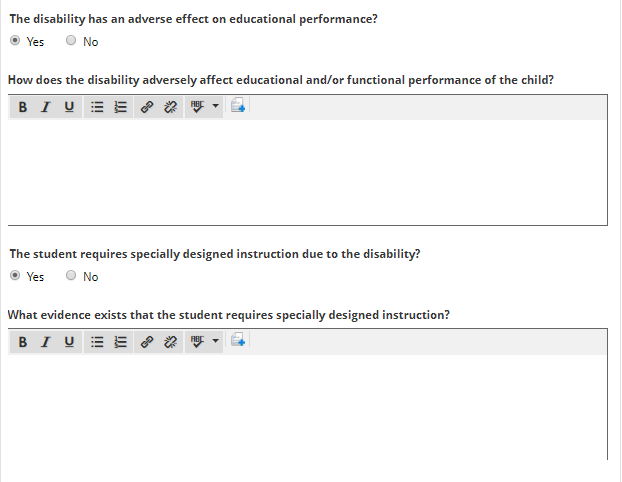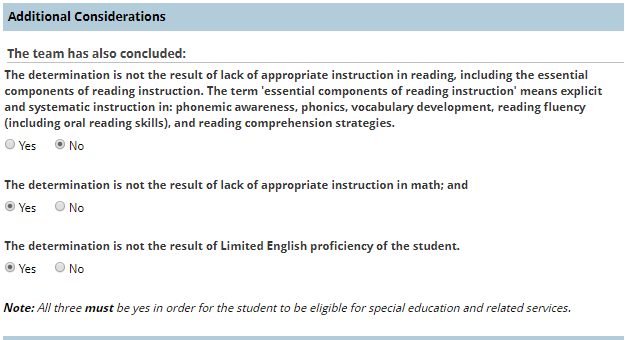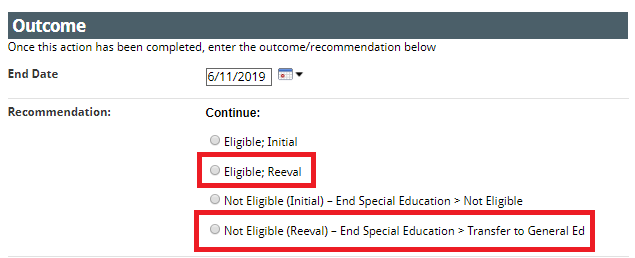Reevaluation Process Reevaluation Planning Meeting Additional Data Needed
Reevaluation Process
Reevaluation Planning Meeting
Additional Data Needed
If the team determines that additional data is needed: the Case Manager should indicate that additional information is needed, the types of data used to make the determination, and the reasons for collecting additional information.
Participants of the Reevaluation Planning Team will sign the Reevaluation Review document and the Case Manager will then upload and attach the signed document within the Reevaluation Review process. In addition, the signed Notification of Meeting must be uploaded within the process.
Consent to Evaluate
If the IEP Team is proposing an evaluation, the parent MUST receive the PWN prior to the primary evaluator requesting Consent for Reevaluation, although both actions may occur in succession (PWN followed by Consent for Reevaluation) at the conclusion of the Reevaluation Review Plan Meeting.
The primary evaluator becomes a Team Member and ensures the Consent for Reevaluation reflects the decision made at the Reevaluation Planning Meeting.
The primary evaluator should add his/her name as a Team Member. br>
- Go to the student’s Programs tab and add the evaluator to the team by selecting Manage Team Members.
Following completion, the
Consent to Evaluate may be sent to the parent via one of the following methods:
- Provided in person
- Sent home with student
- U.S. mail
- Email
When the signed Consent for Reevaluation is obtained from the parent, the primary evaluator completes the Reevaluation Review Outcome Recommendation and End Date and finalizes the Reevaluation Review in Enrich IEP.
The following Outcomes may be selected from:
- Consent Received (three year) - Evaluation - Eligibility Determination: This Outcome should be selected if signed Consent for Reevaluation indicating consent to evaluate was received by the school. The End Date should be the date the signed Consent for Reevaluation was received. Following receipt of the Consent for Reevaluation, the evaluator/s will complete the evaluation within 45 calendar days or before the student’s reevaluation due date.
Enrich IEP will generate a Pending Evaluation and a Pending Eligibility Determination.
- Consent Refused - PWN: This Outcome should be selected if the parent does not give consent for the evaluation. The End Date should be the date the signed Consent for Reevaluation indicating refusal was received. The Primary Evaluator will then complete a Prior Written Notice from the Add Action menu in Enrich. The purpose of this PWN is to clearly state that the parent has refused consent for the proposed evaluation, and to explain the school’s proposed next steps.
- Consent Received (addtnl info only - no Eligibility Determination) - Evaluation: This option will NOT reset the three year reevaluation due date.
Enrich IEP will generate a Pending Evaluation.
Evaluation
The evaluation is completed when each evaluator(s) has administered all test instruments, scored the test protocols, written the report, and the primary evaluator has emailed the complete report to the student’s case manager and Special Education Specialist (SES).
The primary evaluator completes the Outcome for the Evaluation. The Outcome End Date is the date the report was sent to the SPED teacher and SES. The primary evaluator then finalizes the Evaluation in Enrich.
Each evaluator completes their portion of the Evaluation by following the procedure below:
- Indicate “Yes” additional data was gathered in the appropriate area
- Enter the Evaluator(s) name
- Enter the Name of Assessment(s)
- Select the Date Completed
- Enter the Results
The Case Manager will complete will the Notice of Meeting in Enrich IEP. The meeting purpose will default to “Eligibility Determination” and “IEP Development (if appropriate)”. If the student will be of transition age during the life of the IEP, the Case Manager will also select “Transition” as an additional Item to be discussed at the meeting.
All parent contacts related to Notification of Meeting must be documented in the Contact Log embedded within the Eligibility Determination process.
Parent Requests for Independent Educational Evaluations
Independent Educational Evaluations (34 CFR §300.502)
General
As described below, parents have the right to obtain an independent educational evaluation (IEE) of their child if they disagree with the evaluation completed by the school district.
If a parent requests an independent educational evaluation, the school district must provide them with information about where they may obtain an independent educational evaluation and about the school district’s criteria that apply to independent educational evaluations.
Definitions
Independent educational evaluation means an evaluation conducted by a qualified examiner who is not employed by the school district responsible for the education of the child. If the parent disagrees with the District’s evaluation, they have a right to an independent educational evaluation, subject to the following conditions:
- The parent must put the request in writing to the Director of Psychological Services for Greenville County Schools.
- The school district may ask the parent why they object to the District’s evaluation of their child. However, the District cannot require an explanation and may not unreasonably delay providing the independent educational evaluation of the child at public expense.
- Parents are entitled to only one independent educational evaluation of their child at public expense each time the District conducts an evaluation of the child with which the parent disagrees.
- The District must consider the results of the independent evaluation of the child, and if it meets the District’s criteria for independent educational evaluations, in any decision made with respect to the provision of a free appropriate public education (FAPE) to the student.
For more information regarding Independent Educational Evaluations, please refer to the
Parent Handbook for Special Education.
Eligibility Determination Meeting
The purpose of the eligibility meeting is to determine if the student meets eligibility for special education services. The participants on the eligibility team are:
- Parent
- General Educator
- Special Education Service Provider(s)
- Evaluators
- LEA (e.g. administrator)
The eligibility meeting consists of three parts:
- Presentation of evaluation report by evaluator(s): During this portion of the eligibility determination meeting, the evaluator(s) shares the results of the evaluation with the eligibility team. All members of the team should have the opportunity to read the evaluation as the evaluator reviews the test results.
- Disability Worksheets: The evaluator will facilitate the team’s discussion of each disability category(ies) assessed in the evaluation. During this discussion, the evaluator will complete the disability worksheet for each disability considered.
For example, if the disability category of Other Health Impairment was assessed in the evaluation, the Other Health Impairment disability criteria worksheet would be completed.
Similarly, if the disability categories of Other Health Impairment and a Specific Learning Disability were assessed in the evaluation, then the Other Health Impairment and Specific Learning Disability worksheets would both be completed.
For each disability considered, the team will determine whether or not the disability has an adverse effect on educational performance and whether or not the student requires specially designed instruction due to the disability. If the team determines there is an adverse effect on the student’s educational performance, then the team must describe how the disability adversely affects the educational and/or functional performance of the student. Likewise, if the team determines the student requires specially designed instruction, the team must describe the evidence that exists indicating the student requires specially designed instruction.
If the answer is “No” to either of the above questions, the student does not meet the eligibility criteria for the selected disability. If the answer is “Yes” to both of the above questions, there are additional rule out factors that must be considered following the completion of all Disability Worksheets.
- Eligibility Determination: The third component of the Eligibility Determination Meeting is the completion of the Eligibility Determination.
The primary evaluator facilitates the discussion and completion of the Eligibility Determination.
Federal and state regulations are very clear with regard to the fact that a student must NOT be determined to be a student with a disability if the determinant factor is:
- Lack of appropriate instruction in reading, including the essential components of reading instruction (defined in § 1208(3) of the ESEA as phonemic awareness, phonics, vocabulary development, reading fluency including oral reading skills, and reading comprehension strategies);
- Lack of appropriate instruction in math; or
- Limited English proficiency
Users must document these considerations. If, following team discussion, the answer to any of the above questions is “No”, the student will be determined not eligible for Special Education Services.
The team conclusion regarding eligibility will be recorded based on the team determinations from the Disability Worksheets and additional consideration questions.
If the team determines the student is not eligible as a student with a disability the Case Manager will complete the PWN identifying the proposal(s)/refusal(s) and why the action was proposed/refused.
The Case Manager would then select “Not Eligible (Reeval) - End Special Education > Transfer to General Ed” as the Outcome Recommendation, and enter the meeting date as the End Date.
If the team determines the student is eligible as a student with a disability, the Case Manager would select “Eligible; Reeval” as the Outcome Recommendation, and enter the meeting date as the End Date.
If, based on the Disability Criteria Worksheets, the student did not meet criteria for one or more disabilities, the student is not eligible for special education and the case manager will complete the PWN identifying the proposal(s)/refusal(s) related to “Identification” and why the action was proposed/refused.
Following the completion of the eligibility determination, the Eligibility Determination is printed and signed by each team member. The primary evaluator will upload the signed eligibility determination.
If the Eligibility Determination Meeting is not immediately followed by an IEP meeting, the case manager will provide parents with PWN related to the proposal(s)/refusal(s) and why the action was proposed/refused. If an IEP meeting immediately follows the Eligibility Determination Meeting, the case manager may provide one PWN at the conclusion of both meetings relating to all actions proposed/refused in both the Eligibility Determination Meeting and the IEP meeting.
Following the meeting, the paperwork will be filed in the appropriate place:
- For students determined not eligible for special education (DNQ): All original documents will be filed in the with the student’s Special Education records and placed at the back of the student’s permanent record after removing the red “jacket”.
- For students determined eligible for special education: All original documents will be given to the case manager for filing following procedures related to Special Education files.
For additional information on conducting a reevaluation planning meeting when no additional data is needed and no new disabilities are being considered, reference the Reevaluation Planning: No Additional Data Needed/No New Disabilities Being Considered page.
For additional information on conducting a reevaluation planning meeting when no additional data is needed and NEW disabilities are being considered, reference the Reevaluation Planning: No Additional Data Needed/New Disabilities Being Considered page.
Reevaluation Process Reevaluation Plan Meeting Additional Data Needed


